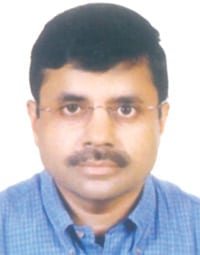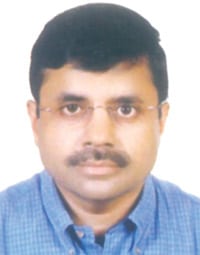

Everybody wants good schooling, but some are forced by circumstances to give education a miss. Our focus is to enable everyone to become educated irrespective of their circumstances, says Manoj Aggarwal – a Gujarat cadre IAS officer, serving as a State Project Director, Sarva Siksha Abhiyan – in an interview with Anand Agarwal of digitalLEARNING.
What are the measures undertaken by the Sarva Siksha Abhiyan to improve education in Gujarat?
Sarva Siksha Abhiyan (SSA) is a flagship programme of the Government of India in partnership with Government of Gujarat. Its mandate is to universalise elementary education. SSA aims to improve the quality of education and place a tab on dropout rates. To fulfil these goals, the SSA has taken steps, such as budget allocation, which is approved by project approval board in the Government of India. The budget provides for things like: teachers salary, teachers grant, civil work, alternate schooling, schooling for out of school children to bring them into educational mainstream, keeping a tab on students, child mapping, school maintenance grant, providing books, uniform and development grant, etc. The project is fully geared to do everything possible for improving the educational and literacy level in the state.
The 8th standard has not been completely included in primary education, what is the target date by which it will be covered in the state?
Already 10,000 schools were started last year and it will be completed by next year.
Tell us about the major projects under SSA that are having a big impact?
SSA seeks to universalise elementary education and to provide educational opportunities to all sections of society, including the socially and economically backward classes and girls falling in the latter sub-section. SSA is taking various steps to mainstream all the children, we have already started Shala Praveshotsav campaign, aiming at 100 percent enrolment for all villages and urban areas, in which the Honourable Chief Minister Shri Narendra Modi is also taking very keen interest. Every year more than 3000 officers, ministers and Chairmen of boards and corporations go to villages and participate in this universal enrolment scheme. They ensure that every girl child is enrolled under the Gujarat Kanya Kelavani karyakaram. This is going on for last eight years and because of that we have achieved enrolment rate of almost 100 percent.
Many critics allege that schemes like SSA are only focussed on quantity; they don’t improve quality. There is a programme called Gunotsav, which aims to improve the quality of education in the state. How the SSA is integrated with the Gunotsav?
The Honourable Chief Minister started Gunotsav in 2009. It has two parts. Part one is self-assessment by schools, which has been done in October this year. In the second part, almost 3000 members, including the Chief Minister, all ministers, Chairmen of corporations, all IAS, IFS, IPS and other senior officers, participate in assessing almost 900 schools. The assessment will be made through focus on aspects of teachers’ work, civil work, involvement of village education committees, environment of schools, computer education, daily attendance, educational tools, their interaction with other schools, status of child as far as studiers are concerned. Even, this year we are going to do a third-party survey to measure the impact Gunotsav has made. So it is holistic in nature and in the long run, it would really help improve the quality.
What are the Information and Communication Technology (ICT) tools that you are adopting to improve the quality of education?
Modern ICT methods are used as much as possible. We have Bhaskaracharya Institute for Space Applications and Geo-Informatics (BISAG) to provide training to teachers. In the schools, we are providing computer-based programmes for computer-aided learning. Already we have 5000 thousand schools where computers have been installed. Another 15000 schools will get the computers this year. We also have sufficient staff to take care of hardware, software and training.
What are your views on PPP in the education sector?
We are using NGOs in many ways; NGOs are involved in the training the school management committees. This is under the provisions of Right to Education. They are helping us improve the quality of the education in a big way.
| We have introduced a toll-free help-line last month that works across the state. If someone finds a child who is not attending school, they can call this number |
What are the major challenges that you face and what steps are you adopting to tackle these?
In our large country, there is multiplicity of everything and this leads to problems. Everybody wants good schooling, but some are forced by circumstances to give education a miss. Our focus is to enable everyone to become educated irrespective of circumstances. Moving from one place to another and having socio-eco disparities affect education. It is important to ensure that 100 percent of the students should achieve a minimum basic education till class 8th.
We try to tackle the dropouts from every angle. For instance, to tackle the problem seasonal migration, or migration due for employment purposes, we urge parents to leave their children behind with a caretaker. We provide the basic help through inputs like meals, etc.
We have introduced a toll-free help-line last month that works across the state. If someone finds a child who is not attending school, they can call this number. We try to cover everything, including textbooks and uniforms. We are also thinking of providing transportation facility to those students who stay far away. Besides putting all efforts to retain students, we are also training teachers, updating the curriculum on the lines of national curriculum and NCERT. So, a holistic approach is being adopted to tackle all the challenges.
As you are talking about encouraging results, so what next have you planned for next 2-3 years?
Our task is to make quality education free. We want to create an infrastructure that is so efficient that parents will think ten times before sending their child to private school. According to the Right to Education Act, by 2013 a number of digital facilities will have to be provided. We are moving in that direction to provide the entire physical infrastructure including number of schools, computers, playgrounds and whatever is required for good quality education that would be achievable by 2013. Once the infrastructure is completed to a high degree, our focus will shift towards providing the quality, which will be leveraged through teacher training.






















